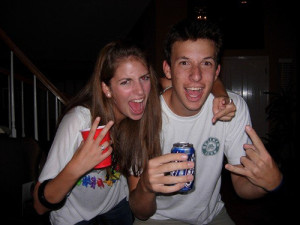Massachusetts law doesn’t allow anyone to provide alcohol to minors – those under the age of 21, with a few very limited and rare exceptions. In fact, Title 20 of the Massachusetts General Laws entitled, “Public Safety and Good Order” clearly states in Chapter 138, Section 34 (especially subsections A through C) that minors may not: (1) possess, carry or transport alcohol; (2) try to purchase alcohol or ask others to do so for them while underage; or (3) make false statements about their age – or use false identification – in an effort to obtain alcohol.
Penalties for Minors and Others Who Violate These Provisions
 Adjudications of minors (or “convictions” for these type of offenses) are considered misdemeanors under Massachusetts law;
Adjudications of minors (or “convictions” for these type of offenses) are considered misdemeanors under Massachusetts law; - If a juvenile transports, carries or possesses alcohol and is fully adjudicated, assessed penalties will be based upon whether or not it’s a first or later offense. Fines can range from $50 to $150. The court making this judgment will then notify the registrar of motor vehicles who will then suspend the juvenile’s license (or right to drive a car) for 90 days;
- Should a juvenile be adjudicated for making arrangements through others to obtain alcohol for himself or herself – or supply false identification to a merchant or vendor to receive alcohol, that person can be assessed a fine up to $300 and the registrar of motor vehicles can suspend that juvenile’s right to drive for 180 days;
- If an adult provides a juvenile with alcohol, he or she will have committed a misdemeanor. A fine of up to $2,000 can be collected and/or the person can be sentenced to spend up to a year in jail, depending upon the circumstances surrounding the offense; (This is known as the social host law.)
- Section 34B also holds that “Any person who is discovered by a police officer or special police officer in the act of violating the provisions of this section may be arrested without a warrant by such police officer or special police officer and held in custody, in jail or otherwise, until a complaint is made against him for such offense . . .”
- Of course, driving while under the influence of alcohol has special penalty implications, particularly with regard to a driver’s license. The registry can suspend your license for blowing a .02% BAC if you are under the legal age.
Statutory Exceptions to this Offense
- Licensed Vendors. Establishments licensed to sell alcohol can employ minors between the ages of 18 and 21 who can handle and transport alcohol – but not consume it – in the performance of their jobs. Any minors under age 18 in such places are not allowed to have any contact with alcohol while handling their work;
- When a Parent or Guardian Accompanies the Minor. Under these circumstances, minors can transport, possess or carry liquor – but not consume it;
- When Family Members Provide Alcohol to Minors on Private Property. A person older than 21 who is a minor’s guardian, parent, grandparent or spouse can provide alcohol to a minor – if these events take place on private property under the adult’s control.
Juvenile Courts
Anyone under 17 charged with a criminal offense, including drunk driving must appear in Juvenile court. The juvenile court rules are different than those in regular district court.
I have represented clients in juvenile court, and I outline some of the differences here.
But call me for a consultation. The most important thing I can do in a juvenile case is help a young person avoid the most serious long term consequences to a criminal record.
If you’ve been arrested or accused of committing any serious crime including a DUI, you can contact the Law Offices of Massachusetts criminal defense attorney Russell J. Matson — 24 hours a day — to obtain the criminal defense representation you need: (781) 380-7730.
—

